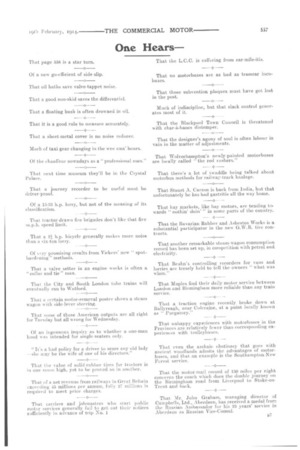One Hears
Page 3

If you've noticed an error in this article please click here to report it so we can fix it.
That page 558 is a star turn.
Of a new go-efficient of side-slip.
That oil baths save valve-tappet noise.
That a good non-skid saves the differential.
That a floating bush is often drowned in oil.
That it is agood rule to measure accurately.
That a sheet metal cover is no noise reducer. Much of taxi gear changing in the wee sina' hours. Of the chauffeur nowadays as a " professional man."
That next time museum they'll be in the Crystal Palace.
That a journey recorder to be useful must be driver-proof.
Of a13-33 h.p. lorry, but not of the meaning of its classification.
That tractor-drawn fire brigades don't like that five m.p.h. speed limit,
That a 21 h.p. bicycle generally makes more noise than a six-ton lorry.
Of very promising results from. Vickers' new " spothardening" methods.
That a valve setter in an engine works is often a "collar and tie" man.
That. the City and South London tube trains will eventually run to Watford.
That a certain motor-removal poster shows a steam wagon with side-lever steering.
--o- That some of those American outputs are all right for Tuesday but all wrong for Wednesday.
Of an ingenuous inquiry as to whether aone-man hood was intended for single-seaters only.
" It's a bad policy for a driver to scare any old lady —she may be the wife of one of his directors."
That the value of solid-rubber tires for tractors is in one sense high, yet to be proved so in another.
That of a net revenue from railways in Great Britain axceeding 45 millions per annum, fully 27 millions is required to meet prior charges.
That carriers and jobmasters who start public motor services generally fail to get out their notices sufficiently in advance of trip No. 1 That the L.C.C. is suffering from ear-miIe-itis.
That no motorbuses are as bad as tramcar incubuses.
That those subvention plaques must have got lost in the post.
Much of indiscipline, but that slack control generates most of it.
That the Blackpool Town Council is threatened with char-k-banes distemper.
—0--
That the designer's agony of soul is often labour in vain in the matter of adjustments.
That Wolverhampton's newly-painted motorbuses are locally called "the red rushers."
That there's a lot of twaddle being talked about motorbus methods for railwaaatrack haulage.
That Stuart A. Curzon is back from India, but that unfortunately he has had gastritis all the way home.
That hay markets, like hay motors, are tending Lawards " nothin' doin' " in some parts of the country.
_ 4—
That the Bavarian Rubber and Asbestos Works is a substantial participator in the new G.W.R. tire contracts.
That another remarkable steam-wagon consumption record has been set up, in competition with petrol and electricity.
That Bruhn's controlling recorders for vans and lorries are tersely held to tell the owners " what was when."
That Maple-s find their daily motor service between London and Birmingham more reliable than any train service.
.__o_ _
That a tractioa engine recently broke down at Ballyreagh„ near Coleraine, at a point locally known as " Purgatory."
That unhappy experiences with motorbuses in the Provinces are relatively fewer than corresponding experiences with trolleybuses.
That even the archaic obstinacy that goes with ancient woodlands admits the advantages of motorbuses, and that an example is the Southampton-New Forest service.
That the motor-mail record of 130 miles per night concerns the coach which does the double journey on the Birmingham road from Liverpool to Stoke-on
That Mr. John Graham, managing director of Campbells, Ltd., Aberdeen, has received a medal from the Russian Ambassador for his 25 years service in -Aberdeen as Russian Vice-Consul.
Trent and Lack.






















